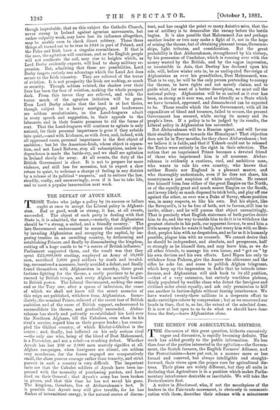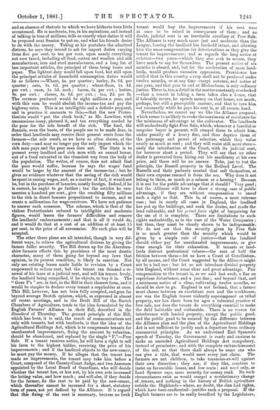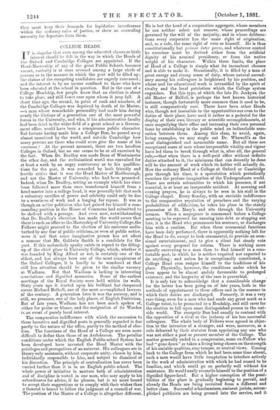THE REMEDY FOR AGRICULTURAL DISTRESS.
THE discussion of this great question, hitherto excessively- vague and discursive, is rapidly becoming definite. The week has added greatly to the public information. No less than four of the parties interested in the agitation—the Govern- ment, the Scotch farmers, the English Farmers' Alliance, and the Protectionists—have put out, in a manner more or less formal and reserved, but always intelligible and straight- forward, their views upon the proper cure for agricultural dis- tress. Their plans are widely different, but they all unite it declaring that Agriculture is in a position which makes Parlia- mentary interference desirable or inevitable. We will take the Protectionists first.
A writer in Blackwood, who, if not the mouthpiece of the leaders in the Fair-trade movement, is obviously in communi- cation with them, describes their scheme with a minuteness and an absence of rhetoric to which we have hitherto been little accustomed. He is moderate, too, in his aspirations, and instead of talking in tens of millions, tells us exactly what duties it will be proposed next Session to put on, and what his friends desire to do with the money. Taking as his postulate the admitted distress, he says they intend to ask for import duties varying from five per cent. to ten per cent. upon nearly everything not now taxed, including all food, cotton and woollen and silk manufactures, iron and steel manufactures, and a long list of less important articles, the principal of them being boots and paper. The lightest duty would fall upon food, but still upon the principal articles of household consumption duties would be as follows :—Wheat, 4s. per quarter ; barley, 2s. 6d. per quarter ; oats, is. 6d. per quarter ; wheat-flour, is. 4d. per cwt. ; oxen, is. 5d. each ; bacon, 3s. per cwt. ; butter, 8s. per cwt. ; cheese, 4s. 6d. per cwt. ; tea, 2d. per lb. The revenue produced would be eight millions a year, and with this sum he would abolish the income-tax and pay the highway rates. This is an intelligible and a definite proposal, and in practice it amounts to this —that the new Protec- tionists would "put the clock back," as Mr. Lowther, with unconscious irony, phrased it, and tax everything needed by the poor for the sole benefit of the rich. The food, the flannels, even the boots, of the people are to be made dear, in order that landlords may receive their present• rents from the farmers—the sole result, as we have so often shown, of the corn duty—and may no longer pay the only impost which the rich man pays and the poor man does not. The State is to present every landlord and rich man with an annual bonus, out of a fund extracted in the clumsiest way from the body of the population. The writer, of course, does not admit that the poor would suffer, because he says the wages' fund would be larger by the amount of the income-tax ; but he gives no evidence whatever that the saving of the rich would be spent in raising wages, and, as a matter of fact, it would not be, but in the purchase of luxuries, mostly foreign. Indeed, if he is correct, he ought to go farther ; tax the articles he enu- merates a hundred per cent., give the resulting fifty millions to the rich in direct bonuses proportioned to income, and so create a millennium for wage-receivers. We have not patience to answer such nonsense. The scheme, which is that of the violent Protectionists reduced to intelligible and moderate figures, would lessen the farmers' difficulties and remove the landlords' embarrassments ; and that is all it would do, and it would do that at a cost of an addition of at least 15 per cent, to the price of all necessaries. No such plan will be accepted.
The other three plans are all intended, though in very dif- ferent ways, to relieve the agricultural distress by giving the farmer fuller security. The Bill drawn up for the Aberdeen- shire farmers effects this by provisions of the most drastic character, many of them going far beyond any laws that opinion, in its present condition, is likely to sanction. Not only are existing leases made liable to revision by a Court empowered to reduce rent, but the tenant can demand a re- newal of his lease at a judicial rent, and sell his tenure freely, the landlord being compelled, if he objects, to buy it in. The "three F's" are, in fact, in the Bill in their clearest form, and it would be simpler to declare every tenant a copyholder at once. This Bill, however, has not been fully accepted, and goes far beyond average Scotch opinion, which, as expressed in almost all recent meetings, and in the Draft Bill of the Scotch Chambers of Agriculture, tends to the idea formulated by the English Farmers' Alliance in their Bill, described in the Standard of Thursday. The ground principle of this Bill, which has been, it is said, the result of communications not only with tenants, but with landlords, is that the idea of the Agricultural Holdings Act, which is to compensate tenants for =exhausted improvements, fixing the amount by valuation, should be abandoned, and replaced by the single "F,"—Free Sale. If a tenant receives notice, he will have a right to sell his farm to the highest bidder, receiving the price of his improvements ; and if the landlord objects to the new-corner, he must pay the money. If he alleges that the tenant has made no improvements, the tenant may take him before a Court, composed of the County-Court Judge, and two Assessors appointed by the Local Board of Guardians, who will decide whether the tenant has, or has not, by his own acts increased the letting value, and how much ; and will also, if they decide for the farmer, fix the rent to be paid by the new-comer, which thereafter cannot be increased for a short, statutory term of years, not yet defined by the Alliance. It is argued that this fixing of the rent is necessary, because no fresh tenant would buy the improvements if his rent were at once to be raised in consequence of them ; and no doubt, judicial rent is an inevitable corollary of Free Sale. The Alliance is very much more just and moderate than the League, leaving the landlord his freehold intact, and allowing him the same compensation for deteriorations as they give the tenant for improvements ; and as regards the long notice of eviction—two years—which they also seek to secure, they have much to say for themselves. The present notice of six months is absurd, and, but for the moderation of most land- lords, would produce excessive oppression. Providence has settled that in this country a crop shall not be produced under twelve months, or at any time except autumn, and notice of one year, and that year to end at Michaelmas, is only ordinary justice. There is, too, a detail in the matter constantly overlooked —that a tenant in taking a farm takes also a home, that if tolerably secure, he spends money on that home, not much, perhaps, but still a perceptible amount, and that to turn him out summarily while he pays his rent is, at all events, hard.
Nevertheless, we cannot say we like the Alliance proposal, which seems to us likely to evoke the maximum of resistance for the minimum of advantage to the cultivator. The landlords will undoubtedly fight Free Sale, which, whenever a fanciful or sanguine buyer is present, will compel them to admit him, under penalty of a heavy fine, and thus deprive them of the patronage and power of selection, which they value nearly as much as rent ; and they will resist still more strenu- ously the introduction of the Court, with its judicial rent, for however short a period. They will say that no other dealer is prevented from hiring out his machinery at his own price, and there will be no answer. Take, just to test the principle, the Russell property in the Bedford Level. The Russells and their partners created that soil themselves, at their own expense rescued it from the sea. Why does it not belong to them, as much as a salmon or a herring? Because it is not for the public advantage that it should? Very good ; but the Alliance will have to show a strong case of public advantage, if they are without compensation to annul such a right as that. This is, of course, a most extreme case ; but in nearly all cases in England, the landlord has put up the buildings, and sunk the drains, and made the land culturable, and his prima facie right of bargaining for the use of it is complete. There are limitations to such rights undoubtedly, as in the case of the Water Companies ; but then, they must be clearly shown to be indispensable. We do not see that the security given by Free Sale is so much greater than the security which would be given by a simple rule of justice—that the landlord should either pay for unexhausted improvements, or give time enough for their exhaustion. If tenants or land- lords distrust professional valuers—the root of half the friction between them—let us have a Court of Conciliation, by all means, and the Court suggested by the Alliance might not be a bad one ; but let us not introduce divided property into England, without some clear and great advantage. Fair compensation to the tenant is, as we said last week, a fine on capricious disturbance, and a just fine ; and beyond that, and a minimum notice of a clear, cultivating twelve months, we should be slow to go. England is not Ireland, that a farmer must choose between an exorbitant rent and the workhouse, nor was the English tenure violently superimposed on tribal property, nor has there been for ages a tolerated practice of free sale, nor does the tenant do everything essential to make the field habitable and culturable. There is no reason for interference with landed property, except the public good, and the public good to be secured by the difference between the Alliance plan and the plan of the Agricultural Holdings Act is not sufficient to justify such a departure from ordinary commercial principles. As we understand Earl Spencer's speech of Tuesday, the Government is ready and anxious to make an amended Agricultural Holdings Act compulsory, instead of permissive ; and with the complete enfranchisement of the soil, so that there shall always be some one who can give a title, that would meet every just claim. The farmers are not children, to take tenancies-at-will against their own discretion ; they can, if they like, combine to insist on favourable leases, and low rents ; and need only, as Lord Spencer says, more security for money sunk. No such circumstances exist as would compel a revolutionary change of ,tenure, and nothing in the history of British agriculture outside the Highlands—where, no doubt, the clan had rights, which have been confiscated—justifies such a proposal. If the English farmers are to be really benefited by the Legislature,
they must keep their demands for legislative interference within the ordinary rules of justice, or show an overruling necessity for departure from them.
































 Previous page
Previous page